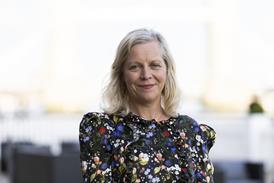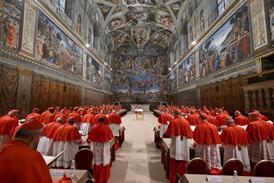While flyaway productions have always been part of the heritage of UK television, a tradition bequeathed by the North Atlantic weather systems if nothing else, the buzz around filming in Eastern Europe is a relatively recent phenomenon.
Once people simply went abroad either for specific locations or for bright blue skies and long, balmy days of shooting. Now there's a new breed of economic migrants toting shooting schedules, waiting for their luggage at the airport carousels in Budapest, Bucharest and Sofia, and hoping to take full advantage of costs that are being billed as up to 25% less than shooting in the UK.
Many of them though will be searching for some time, and not just for their luggage. While productions can save money shooting behind the former Iron Curtain, the figures relating to the amounts saved don't necessarily live up to the hyperbole. Programmes really have to be the right type of production, typically studio-based, to take full advantage of the savings. And ideally you should really know the country you're in and exactly what you're doing while you're there, which can prove a bit of a catch-22 for most Brits.
"Producers are having to be a lot more location-creative in their choices," says Murray Ashton, international editorial research manager for location-finding bible, The Location Guide. "What they're doing is combing the area in multiple recces, taking a look at Bulgaria, nipping into Hungary, having a look at the Czech Republic and so on before they nail it all down."
Ashton adds that in the film business, which has been using Eastern European destinations for a number of years, productions now prepare budgets for half a dozen different locations before getting down to principle shooting.
Perhaps one of the most important things to point out is that Eastern Europe is not a homogeneous group of nation states. Not only are languages and currencies obviously different, but cultures vary widely from the northern states bordering the Baltic down to Bulgaria, a relative stone's throw from Istanbul.
The amount a production can save varies considerably too, with the quantity and nature of tax breaks also shifting across the different countries, though the degree of saving is more typically a function of how long a state has been a member of the EU. Poland, for example, once the cheapest place with a halfway decent infrastructure that could be found within a short-haul flight of the UK, is now approximately only 10% cheaper than filming at home. Romanian production meanwhile can save up to 25% when all the conditions are right.
Unsurprisingly Romania is therefore currently one of the hottest flyaway destinations, forming what Ashton refers to as a "golden triangle" along with Bulgaria and Hungary (which has probably been the most active in terms of incentives and currently offers 20% tax breaks). Its stellar rise through the production firmament started with its hosting of Anthony Minghella's Cold Mountain, which film was either a fantastic argument for producing in Romania or a cautionary tale advising you not to venture beyond the M25, depending on who you talk to. As Minghella himself has tartly observed: "I was working 20 hours a day in a country with no infrastructure."
Box TV managing director and former Channel 4 drama commissioner Gub Neal has shot four times in Romania (including Boudicaand Gunpowder, Treason and Plot) and is heading out there again this autumn to make BBC1's 90-minute Christmas special Sweeney Toddfor the BBC, suggests Cold Mountain's problems were partly of its own making.
"If you're going to harness yourselves to the strengths of those countries you have to harness yourself to the things that they're good at, which is studio production," he says. "They're less capable of delivering when you become reliant on working anywhere in the regions. That takes you away from the efficiency of the studios and into the country's own infrastructure, where you have to deal with poor roads and telecommunications at best. If you want to shoot 120 miles outside Bucharest you have to think very carefully why you want to be there."
The studios are the pride and joys of Eastern European filmmaking. MediaPro, 20km outside Bucharest is a case in point. Set up by a doting father and high-ranking member of the Communist party whose daughter wanted to be a film star in the 1950s, it has 12 sound stages, four water tanks, a Kodak lab a mere 15km away and has produced over 600 films in half a century. In other words it has a long heritage of film-making, one that visiting productions and co-productions can happily tap into.
Eastern Europe's big advantage though lies in the sets. Wages are startlingly low, with the average in Romania for instance hovering well under Euro300 a month. This means that one of the best ways of solving a problem is by throwing warm bodies at it, something that works remarkably well when it comes to set construction. "For building a town and blowing it up, Romania is your country," says director Devon Dickson happily.
Neal estimates that a set which can be built for£150,000 at MediaPro would cost 10 times that amount at Pinewood. "What you lack in locations, whether contemporary or period, you can more than compensate for with your creative right to build what you want," he says. "And you can build it the way you want it, there's no circumnavigating tea rooms and clipboards as you have to with a National Trust property."
As a result it can be cheaper to decamp and build a facsimile of where you want to shoot than it can be to use the real thing. Previous productions' builds can also be taken advantage of to further shave costs. Bucharest's Castel Films has a London street (including Baker Street) available for hire from Euro500 a day, and a medieval English village from Euro200 a day.
Neal says that the habit of throwing people at a project at the last minute to get it completed can make British producers used to a more structured way of working - you sweat a bit at the end, but in his experience it always comes right. Others have their doubts.
"The art department can be a dilemma and because of that you get into other, creeping problems," says Dickson. "The set isn't ready on time and so on your first shoot day you're turning over at four in the afternoon, or it's not right, it's the wrong colour or whatever. There are talented art directors over there but the problem is that there are few of them."
You can crew up abroad, though it's definitely recommended to take your heads of departments from the UK, and you can certainly hire kit over there, although prices for things other than people are a lot more equalised across the continent and the savings are less than enormous.
According to UK-based line producer Rosa Romero what you've got to watch for in everything is transparency. Currently working in Romania on Qwerty Films' horror flick, Severance, she says: "Normally I know almost to the penny where I am. But here, we're discovering things from prep and we're already in week four and leaving at the end of the week."
Romero, already turned away from one location where her team had a contract to shoot on the day of interview, tells a tale of motor homes that arrive with extra crew to provide them with water and electricity. "That means you have to pay for two men in a van for water, two men in a van for electricity and that's every day," she says.
Part of the problem lies in different structures of working (in Hungary electricians and grips are one and the same and you have no riggers per se, says Romero), part of it lies in communication. A good translator that knows the industry is worth his or her weight in gold, although a rising number of the key people speak English as it becomes an increasingly important skill on a CV.
"The language problems are easily surmountable," says David Yates who directed much of Sex Trafficout in Romania last year. "You can feel the pace of change too. I shot there a year ago but the infrastructure is already better than it was." Which could be handy as his latest project, Harry Potter 5, is due to make a decision on whether to shoot in Eastern Europe in the next month or so.
Neal meanwhile advises producers to unclench slightly when it comes to day by day control over the budget. "Don't try and manage the spend on behalf of the studio," he says. "Agree a price and let them get on with it as they've got their own idiosyncratic way of doing things and it'll drive you mad if you get involved."
Two points to finish off with. First, this is an ongoing, dynamic process. Wages in Romania are currently rising at 5% a month - good for the Romanians, not necessarily for flyaways - and Romania and Bulgaria are expected to join the EU in 2007 or 2008, subject to final examinations of their economy and no wobbles of political will in Brussels.
Costs there will ramp up fast. Dickson is one of the few already looking at filming in Russia ("Good 3D and vfx, talented people but no infrastructure," is his current verdict) and in an increasingly globalising world it's not hard to envisage footloose productions straying even further afield.
Media secretary Tessa Jowell signed a statement of intent to start negotiations on a film co-production treaty with Bollywood in March this year, and the UK is looking to establish similar agreements with China, India, Morocco, Jamaica and South Africa. And where film (and, oddly enough, the cash-strapped French TV industry which pioneered shooting in much of Eastern Europe) leads, UK television drama often follows.
But don't go over there thinking of the bottom line, as that's wasting what can be a great opportunity. "Be open to more than just the economic benefits," says Yates. Sex Traffic's lead Anamaria Marinca, the Romanian actress who won a string of awards for her debut TV appearance, is a case in point.
Yates adds: "There are plenty of artistic and creative possibilities out there, so don't go there to exploit, go there to develop. There are opportunities to develop the infrastructure there for everybody's benefit, including the local film-making community, and that would be a wonderful thing to achieve."


























No comments yet